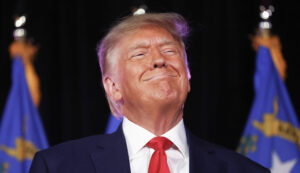Whatever you think of Donald Trump — and I for one think very little of him — his conviction as a felon for what would ordinarily be a minor misdemeanour by a biased jury is a grim day for democracy in America. Yesterday’s decision, the culmination of a vindictive prosecution, was less dramatic than the ransacking of the US Capitol by a pro-Trump mob after the 2020 election — but the long-term ramifications are likely to be far more serious.
Trump, of course, is no angel. In 2020, he attempted to suborn federal and state officials into manipulating election returns, and pressured Georgia Secretary of State Brad Raffensperger, a Republican, into finding enough votes to change the electoral college outcome in his favour in Georgia. In seven other states, his team also plotted to use fake electors to swing the results. To their credit, Raffensperger and other senior Republicans stood up to Trump’s bullying. The rule of law in the United States was put to the test by Donald Trump — and it passed the test.
But now, anti-Trump Democrats, have put the rule of law in America to the test again — and this time it has been bent to the point of breaking. In February, a Manhattan jury found Trump guilty of civil fraud in a case involving alleged overstatements of real estate values. And yesterday, following the prosecution of Democratic District Attorney Alvin Bragg, another Manhattan jury found Trump guilty of alleged violations in a case involving the reporting of hush money payments to the porn star Stormy Daniels. It was the first time a sitting or former US president has been convicted of a crime. It was also the first time that the allies of a president of one party have successfully weaponised the American judicial system in an attempt to destroy the presidential candidate of another.
In both of these cases, the partisan motives of the Democratic prosecutors and judges were evident. Campaigning as a Democrat for the office of Attorney General in New York State in 2018, Letitia James promised that she would selectively prosecute Trump, and find some excuse, any excuse, to do so: “I will never be afraid to challenge this illegitimate president,” she said. “I will be shining a bright light into every dark corner of his real estate dealings and every dealing.” The civil fraud case that James brought against Trump was presided over by Judge Arthur Engoron, an elected judge and a Democrat who was elected to the First Judicial District of New York in 2015 without any Republican opponent, so rare are Republicans in New York.
The partisanship of the Democratic officials in the hush-money case has been just as blatant. Charges like those brought against Trump were rejected as too weak by Cyrus Vance, the previous Manhattan district Attorney, and they were also rejected as too flimsy by Vance’s successor, Manhattan’s current DA, Alvin Bragg. Bragg only changed his mind and brought charges against Trump after two things happened. The first was the publication of a book — People vs. Donald Trump: An Inside Account — by Mark Pomerantz, a member of Bragg’s team who resigned in protest in 2022, claiming that Bragg was not doing enough to prosecute Trump. The second was the fact that, by 2023, it was becoming clear that Trump would be the Republican nominee for the presidency.
In the hush money case, Bragg turned what would ordinarily be a minor misdemeanour involving falsifying records into a felony, by claiming that it was somehow part of a nefarious scheme to interfere in the 2016 election. Yet even eminent legal experts find it hard to explain exactly why Trump was charged: last year, even the Left-wing website Vox described the case’s “legal theory” as “dubious”.
If the charges in these New York cases — and a third case in January, in which Trump was fined $83 million for allegedly defaming E. Jean Carroll by denying that he had raped her — were questionable, the motivations were obvious. The manifest purpose of the extraordinarily high fine in the civil fraud case was to cripple Trump’s presidential campaign against Biden. And the manifest purpose of the conversion of a minor misdemeanour into a felony has been just as clear — to allow Biden and other Democrats to brand Trump as a “convicted felon” between now and the November election, and, if possible, to remove Trump from the campaign trail by jailing him.
Even more disturbing than these kangaroo court trials in one-party Democratic New York is the Espionage Act case against Trump, currently being prosecuted by Special Counsel Jack Smith. Smith was appointed by Biden’s Attorney General Merrick Garland, who just happened to have been blocked from a seat on the Supreme Court by Mitch McConnell and the Republican Senate majority in 2016, after he was nominated by then-President Obama. In a minor dispute over the possession of classified documents between ex-president Trump and the bureaucrats of the National Archives and Records Administration (NARA), Garland had a chance to exact personal revenge. Thus, in August 2022, over the objection of some FBI agents, Garland authorised a raid by FBI agents who, in Trump’s absence, ransacked the Florida home of the ex-president.
Like Trump, Joe Biden kept boxes of classified documents in his home following his stint as Barack Obama’s vice-president. And like Trump, Biden was investigated by a special counsel appointed by Merrick Garland, Robert Hur. But Hur refused to press charges under the Espionage Act against Biden on the grounds that he is “an elderly man with a poor memory”. In stark and disturbing contrast, Smith issued a 37-count indictment against Trump, with most of the charges being based on the Espionage Act of 1917.
From the very beginning, the Espionage Act — a vague, sinister law passed by Congress in a fit of hysteria during the First World War — has been abused by presidents against opposition politicians. President Woodrow Wilson’s Democratic administration used it to give his Socialist presidential rival, Eugene Debs, a 10-year prison term in 1919. In the same year, Victor Berger, a Socialist member of the House of Representatives, was also convicted under the legislation. In spite of winning an election, Berger was denied his seat in Congress and disqualified from public office under Section 3 of the Fourteenth Amendment, an irrelevant clause designed to prevent ex-Confederate insurrectionists from regaining power after the Civil War. Ironically, this is the same archaic provision that was weaponised recently by Democratic officials in Colorado, Maine and Illinois, who sought to disqualify Trump from appearing on Republican primary ballots in those states, before a unanimous Supreme Court in 2024 ruled against such efforts.
Having run for President in 1920 from behind bars, Eugene Debs was pardoned by Republican president Warren G. Hardin in 1921, while Berger’s conviction was also overturned in the same year. In a similar vein, we can only hope that enlightened state or federal courts will overturn the unjust convictions of Trump. But whether or not that happens, the damage to America’s democracy has largely been done.
In the short run, the corruption of the American legal system by Democrats has sundered the reputation of New York state. Yet far worse is the damage to America’s global reputation. Thanks to these Soviet-style show trials, the US can no longer plausibly claim to be a global example of the nonpartisan rule of law and constitutional government. That reputation was already damaged by Trump’s clumsy attempt to overturn the results of the 2020 election. Today, however, thanks to his enemies’ willingness to play a similar game, that perception has been cemented.
For in the future, by weaponising state law to try to destroy federal candidates and officeholders of the rival party, Democrats have opened a Pandora’s box. It is probably only a matter of time before Republican attorney generals start prosecuting present or former Democratic politicians on their own trumped-up charges. And why not? The use of lawfare against Trump has put a target on the back of Democratic politicians. Already some Republicans are calling for prosecutions of James and Bragg under an obscure federal statute against electoral interference. After all, such prosecutions, ruinous as they would be, are more plausible than the cases that those prosecutors have brought against Trump.
In Robert Bolt’s play A Man For All Seasons, Sir Thomas More responds to William Roper’s statement that he would “cut down every law in England” to go after the Devil: “Oh? And when the last law was down, and the Devil turned ’round on you, where would you hide, Roper, the laws all being flat?” The Democrats are about to learn a similar lesson: that even the Devil deserves the benefit of the law.
Disclaimer
Some of the posts we share are controversial and we do not necessarily agree with them in the whole extend. Sometimes we agree with the content or part of it but we do not agree with the narration or language. Nevertheless we find them somehow interesting, valuable and/or informative or we share them, because we strongly believe in freedom of speech, free press and journalism. We strongly encourage you to have a critical approach to all the content, do your own research and analysis to build your own opinion.
We would be glad to have your feedback.
Source: UnHerd Read the original article here: https://unherd.com/



